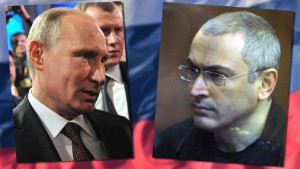- Pussy Riot band members go free under new amnesty law
- A former oil tycoon and political opponent gets pardoned
- Putin wants to improve Russia’s image and promote investment
- The Russian President believes he has crushed the opposition
(CNN) — Less than two months before the world focuses on Russia for the Sochi Olympics, President Vladimir Putin is handing out “get out of jail free” cards.
A new amnesty law introduced by Putin allowed two members of Russian punk band Pussy Riot to leave prison on Monday, two months before the end of their two-year sentences for a performance critical of the President.
In addition, 30 Greenpeace demonstrators could go free under the amnesty law passed by Russian lawmakers last week that could affect 25,000 prisoners.
Putin also pardoned former oil tycoon and Kremlin critic Mikhail Khodorkovsky, who had been jailed since 2003 and was convicted in 2005 of tax evasion and fraud.
It all is part of a public relations offensive by Putin, who has solidified his political dominance in Russia and now seeks to improve the country’s image ahead of the Olympic Games that begin February 7 in the Black Sea city of Sochi.
 Putin frees jailed rival
Putin frees jailed rival
The amnesty law and the Khodorkovsky release “are to a certain extent tied to the upcoming Olympics,” said CNN Foreign Affairs Correspondent Jill Dougherty.
Russia’s international image has suffered from an anti-gay law passed under Putin, with threats of protests and boycotts at the Olympics over its bans on “homosexual propaganda.”
In addition, the jailing of Khodorkovsky harmed foreign investment in Russia because it smacked of political repression, Dougherty noted.
“Russia wants to improve its image and increase investment in the country,” she said, adding that Khodorkovsky’s imprisonment “caused some businesses to think twice about” getting involved in Russia.
Russia has faced international criticism for its treatment of Khodorkovsky, once Russia’s richest man, with countries including the United States accusing it of “selective prosecution” and abuse of the legal system.
He became both a political and economic threat to Putin by wanting to create a commercial oil pipeline that would break the government monopoly on the industry and by funding opposition politicians, Dougherty said.
Khodorkovsky, who was due for release next year, wrote Putin a letter from prison that asked for early release because his mother was ailing. He insisted the letter contained no admission of guilt, and Putin said the pardon was on humanitarian grounds.
Upon his release, Khodorkovsky left the country and has said he won’t continue his political activities against the Russian government.
“Putin really believes that he’s basically crushed the opposition, that he doesn’t have to worry about them anymore,” Dougherty said, calling the move a commentary on Russian society that now has relative political stability after major anti-government demonstrations in 2011. “He may well think that he’s had some victory over the opposition.”
The government linked the new amnesty law to the anniversary of the 1993 adoption of Russia’s post-Communist constitution.
However, the Pussy Riot performers, Maria Alyokhina and Nadezhda Tolokonnikova, called it a publicity stunt aimed at improving Russia’s image ahead of the Sochi Games.
“President Putin obviously used this amnesty option to (brighten) up his image before the Olympic games,” said Pyotr Verzilov, the husband of Tolokonnikova.
“Two months out of the almost two years that the girls have served is not much,” he said. “So the effect of this amnesty for Maria and Nadezhda is not really felt.”
Pussy Riot’s 2012 performance of a “punk prayer” at a Russian Orthodox cathedral criticized Putin, who was prime minister at the time. The musicians were found guilty of hooliganism.
According to Russian media, Alyokhina and Tolokonnikova qualified for amnesty under the new law because they have young children.
The Pussy Riot case made headlines around the world, as did the anti-gay law passed in July that banned “propaganda of nontraditional sexual relations around minors.”
It bars the public discussion of gay rights and relationships anywhere children might hear it — and has been condemned by Russian and international rights groups as highly discriminatory. Critics say it is so vague that wearing a rainbow t-shirt or holding hands in public with someone of the same sex could bring prosecution.
Last week, Putin defended the new law as necessary to defend the conservative Russian society from “values which are received in a difficult way by our citizens.”
Asked about the issue by CNN’s Dougherty at a news conference, Putin said the law wasn’t about criticizing anyone, but instead involved “protecting us from rather aggressive behavior from some social groups who, in my opinion, are trying to impose their points of view in a rather aggressive way.”
In an apparent jab at the anti-gay laws, the United States announced this week that its delegation to the Winter Olympics will include openly gay athletes such as tennis legend Billie Jean King and hockey player Caitlin Cahow. No member of President Barack Obama’s family or current Cabinet will attend.
CNN’s Jethro Mullen, Diana Magnay, Alla Eshchenko, Laura Smith-Spark, Jason Hanna and Yousuf Basil contributed to this report.
![]()
CNN.com Recently Published/Updated
Confident Putin frees foes ahead of Sochi Olympics